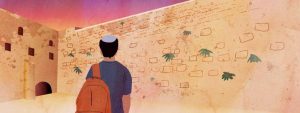
Art by Sefira Lightstone
A WEEKLY TORAH THOUGHT FROM RABBI MORDY
I am a Chabad rabbi. This coming Shabbat, I hope to join thousands of Chabad rabbis from around the world at a convention in New York; together we are known as “Shluchim,” emissaries of the Lubavitcher Rebbe, Rabbi Menachem Schneerson, whose leadership and lessons inspire us all. This past weekend, one of my fellow Shluchim, Rabbi Tzvi Kogan, was kidnapped and brutally murdered in Abu Dhabi. This act of terror caused a rush of emotion in me, but my main takeaway from this horror was hauntingly familiar: Such abhorrent darkness needs to fought with a sheer outpouring of light, otherwise known as unity, compassion, tolerance, selflessness, love. Easier said than done, I know, but there is no other way. And the time is now.
As always, the Torah provides guidance.
This week’s portion, Toldot, speaks about the life of Isaac our Forefather, and his twin sons, Jacob and Esau. The portion begins in a weirdly repetitive way: “These are the generations of Isaac, the son of Abraham; Abraham begot Isaac.” Why do we need this twice? Every word in the Torah is exact so why the need to repeat?
We are told that Isaac miraculously looked like his father and so we say it twice to make that understood.
Miracle? Why the miracle? Don’t we see it happen all the time that sons have an uncanny resemblance to their dads? Some commentators say that the reason the resemblance was “miraculously” clear was that Abraham fathered Isaac at such an old age; because people might “question” the paternity, G-d made sure it was a “no doubter.”
There are many explanations given for this but I’d like to focus on the esoteric. Kabbala (the deeper spiritual meaning of the Torah) explains that Abraham represents kindness while Isaac, though his son, represents severity, or toughness. Both traits were needed in order to establish the nation that would become the People of Israel. But they were also polar opposite traits. How can these two giants who represent such different characteristics be at all alike? They must be the furthest thing from each other! And so G-d miraculously ensured that they had this common appearance. Why? Because while their method of serving G-d and making this world better may be from different perspectives, at their core they share a common bond. As we prepare for what might be a difficult Shabbos, we must take this lesson with us: We must hope that the Rebbe’s teachings reflect in how we interact with others and should all see others in the same light. Let us hope and pray that there is something, certainly in those we may not have much seemingly in common with, but even in those we disagree with, that unites us and can bring us together. Perhaps through our collective open hearts and minds, this Thanksgiving will be a more peaceful and pleasant one for all. Good Shabbos.





